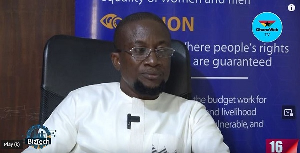Emmanuel Frimpong, associate professor of fisheries science in the College of Natural Resources and Environment at Virginia Tech, has been named a Carnegie African Diaspora Fellow.
The scholar program, which supports 100 short-term faculty fellowships for African-born academics, is offered by the Institute of International Education and funded by a two-year grant from Carnegie Corporation of New York.
Frimpong, who joined the faculty of the Department of Fish and Wildlife Conservation in 2007, focuses on the ecology, life history, and distribution of freshwater fish with an emphasis on applications in aquaculture and the conservation of fish and fisheries.
He collaborates with the U.S. Agency for International Development’s AquaFish Innovation Lab on research and development projects in Ghana, Kenya, and Tanzania. His research in the United States is funded by the National Science Foundation’s Division of Environmental Biology and the U.S. Geological Survey’s Aquatic Gap Analysis Program.
In outreach and service to his profession, Frimpong created a comprehensive database of more than 100 biological traits of 809 U.S. freshwater fish species and worked with University Libraries at Virginia Tech to make the database available online to scientists across the country.
The prestigious Carnegie African Diaspora Fellow program is limited to African-born individuals currently living in the United States or Canada and working in higher education. Fellows engage in educational projects proposed and hosted by faculty of higher education institutions in Ghana, Kenya, Nigeria, South Africa, Tanzania, and Uganda.
The fellowship is “validation of what I have worked very hard to accomplish — to be a significant contributor to research and development in Ghana and sub-Saharan Africa,” Frimpong said.
It will give him the opportunity to spend an extended period of time in his home country of Ghana, collaborating with Kwame Nkrumah University of Science and Technology to develop aquaculture, fisheries, and water resources management curricula and to conduct research on aquaculture development for food security and the conservation of fish and fisheries.
“With three months in Ghana, I hope to have more time to see problems up close and contribute my expertise substantively to the solutions,” he said. “Finding ways to solve immediate problems of humanity with the scientific knowledge and tools we have now motivates me. If the people of sub-Saharan Africa can be taught to manage their natural resources well, they will have the resources they need now and for future generations.”
Frimpong received a bachelor’s degree from the University of Science and Technology in Ghana, master’s degrees from the University of Arkansas at Pine Bluff and Virginia Tech, and a doctorate from Purdue University.
The College of Natural Resources and Environment at Virginia Tech, which consistently ranks among the top three programs of its kind in the nation, advances the science of sustainability. Programs prepare the future generation of leaders to address the complex natural resources issues facing the planet. World-class faculty lead transformational research that complements the student learning experience and impacts citizens and communities across the globe on sustainability issues, especially as they pertain to water, climate, fisheries, wildlife, forestry, sustainable biomaterials, ecosystems, and geography. Virginia Tech, the most comprehensive university in Virginia, is dedicated to quality, innovation, and results to the commonwealth, the nation, and the world.
Diaspora News of Wednesday, 22 October 2014
Source: vtnews.vt.edu
Virginia Tech's Emmanuel A. Frimpong named a Carnegie African Diaspora Fellow

















